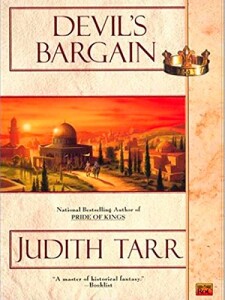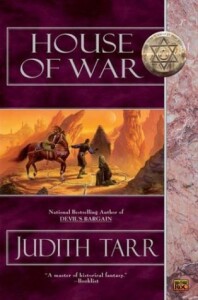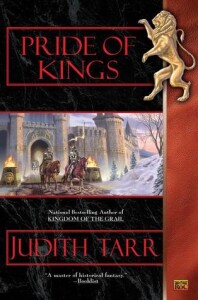 While Judith Tarr’s novels Devil’s Bargain, House of War, and Pride of Kings are supposedly historical fantasies dealing with the Crusades, one of the most bloody, savage, and violent episodes of our history, the books are disappointingly tame, boring, naïve, and biased.
While Judith Tarr’s novels Devil’s Bargain, House of War, and Pride of Kings are supposedly historical fantasies dealing with the Crusades, one of the most bloody, savage, and violent episodes of our history, the books are disappointingly tame, boring, naïve, and biased.
In Devil’s Bargain, Christian King Richard the Lionheart is off cutting a swath through the armies of Saladin, with his illegitimate pagan half-sister Sioned following close behind. While Richard is courteous and respectful towards Saladin’s envoy, his brother and powerful mage Ahmad, he has no intent to parley or form any deals until the Holy Sepulcher of Jerusalem is in good Christian hands. Young Sioned, however, takes a liking to the fellow and approaches him for magical instruction.
While Richard loathes the art of magic and avoids its use whenever possible, his mother, the formidable Queen Eleanor, has used her sorceress powers to make a bargain with a wizard of almost god-like power to secure Richard’s victory. This wizard Sinan, however, oversteps the boundaries of the pact and names a price that no one was expecting to have to pay.
While Devil’s Bargain followed, more or less, the true history of the Crusades (up until the end, of course – in reality, Richard never won Jerusalem), its sequel House of War deviates entirely from any historical path. Richard has been king of Jerusalem for a dozen years, Sioned and Ahmad are wed and still mourning the death of their young son, and their neglected daughter Teleri is messing around with her inherited magical talents with disastrous results. The Old Man of the Mountain, Sinan, returns from beyond the grave to wreak vengeance on those who defeated him in the first book, and, naturally, all of the main characters have to team up to ensure that Sinan returns to Hell and stays there.
 With Pride of Kings, a reader might experience a fair amount of confusion at the beginning, until realizing that, although Pride of Kings occurs during the same period and with much of the same characters and magical traits, it is an independent novel and has absolutely no connection or continuity with the other books whatsoever.
With Pride of Kings, a reader might experience a fair amount of confusion at the beginning, until realizing that, although Pride of Kings occurs during the same period and with much of the same characters and magical traits, it is an independent novel and has absolutely no connection or continuity with the other books whatsoever.
In Pride, Richard is still Richard, brazen and stubborn and magically prejudiced, to the point that when he is crowned King of England, he refuses to accept the subtly different “crown of Britain,” a ritual that will bind him to the land with magic and give him access to the “armies of the air.” The mortal crown has barely touched his brow before he quickly abandons his nation to continue his Crusade.
In a clever twist, the Lionheart’s departure leaves Britain defenseless, and so his brother John’s ambition to gain the throne of Britain and bind himself to it is seen as absolutely necessary to ensure Britain’s safety. He remains fully cognizant of the fact that even though he is worthy to bind himself to Britain, in name and in history he will be seen only as shameless usurper. This adds a compelling extra layer to John’s character.
The main characters of this novel, however, are Arslan and Echiva, the half-ifrit squire and magical guardian to the new king, respectively. Calling upon their own magical talents (in a version of England where magic is so prevalent that someone completely devoid of talent is a rare individual), and the powers of the land, they race against time to see that Britain is protected against the machinations of Philip, the King of France in name and in power.
Structurally speaking, Devil’s Bargain and House of War are the better conceived. Pride of Kings adheres so strictly to the real turn of events that it can be read as a shambling daisy-chain of encounters, conflicts, and resolutions. However, the characterization and overall execution of storytelling are more masterfully orchestrated in Pride. Despite the fact that Richard and his allies have a war to win and an enemy to defeat, all of the main players in Devil and House are surprisingly (and rather anachronistically) open-minded and tolerant to the point of tedium. Richard, who is a Christian, doesn’t mind that his sister is an unbaptised pagan, nor is he ruffled that she falls in love with a devout Muslim, who is the brother of Saladin himself. They, in turn, don’t seem to care very much that Richard is “not a man for women”; in fact, his exclusively homosexual nature is apparently so obvious that it is seen as a rather humorous political joke. “Not one for making heirs, is he?” they laugh, with a nudge and wink.
 However, in a rather disconcerting contradiction, Judith Tarr, who provides an intelligent and fair-minded view of Islam and paganism in these novels, is disappointingly biased against Christianity. True, this is the Crusades, and the Vatican was hardly working to gain any points during that era, but while Islam and Judaism are explained to have their own magics and spirits, Christianity is seen as a restrictive, magically dead religion. On an expedition to Rome in an attempt to commandeer a weapon that might defeat Sinan, Sioned and Ahmad express their disgust at the “sheer Christianity” of the place, describing the faith as a “religion of walls and restraint, a closing of the spirit to any thought but what the priests bade their faithful to think.” Now, now – that’s hardly tolerant.
However, in a rather disconcerting contradiction, Judith Tarr, who provides an intelligent and fair-minded view of Islam and paganism in these novels, is disappointingly biased against Christianity. True, this is the Crusades, and the Vatican was hardly working to gain any points during that era, but while Islam and Judaism are explained to have their own magics and spirits, Christianity is seen as a restrictive, magically dead religion. On an expedition to Rome in an attempt to commandeer a weapon that might defeat Sinan, Sioned and Ahmad express their disgust at the “sheer Christianity” of the place, describing the faith as a “religion of walls and restraint, a closing of the spirit to any thought but what the priests bade their faithful to think.” Now, now – that’s hardly tolerant.
What these three books share in common is that all three are shamelessly, ridiculously romantic. More often than not, it’s love at first sight, and usually with someone who is twice or half their age. Eschiva is accused of cradle-robbing when she weds a sixteen-year-old Arslan. Sioned’s in her teens when she woos Ahmad, the Sultan of Cairo (who already possesses his fair share of wives, concubines, and adult sons). Mustafa (Richard’s faithful servant/spy) is thirty-one when he spots the youth Giulliano in Rome (whose family is remarkably unfazed, because they used to live in Greece). How are we supposed to believe the plot device that allows Arslan to render a centuries-old undine senseless with desire, all the while remaining faithful to his wife, by practising the “ancient Eastern arts” he learned from a Damascene whore? As if the beautiful undine, who is implied at the start as having a voracious taste for pretty men, had never experienced foreplay and oral sex in her immortal life? Well, since I suppose she’s a western European creature, she’s probably never heard of the “ancient Eastern arts,” which apparently any sixteen-year-old boy with a mind to learn can achieve. Perhaps.
Pride of Kings was mildly diverting, but Devil’s Bargain and House of War sadly disappoint. Both are barely more than the standard “quest for the magical object to save us all from impending disaster,” with a few historical bits and a great deal of sex thrown in for good measure. I wish Tarr could have gone into a little greater detail of how magic worked for the characters, but as it is, the fantastical elements seem stale and overused.
(Roc, 2002)
(Roc, 2002)
(Roc, 2003)
